 Leading Blog | Posts by Month |
 Leading Blog | Posts by Month |
04.30.08

Creativity Is Not Just For Artists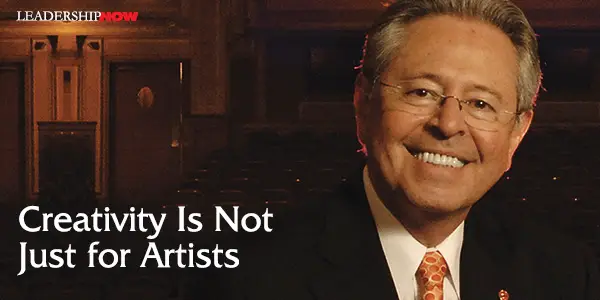
Miguel Angel Corzo, former President and CEO of The Colburn School, an accomplished leader himself and internationally recognized for his contributions to the arts, chaired a session on creativity at the What Makes Us Human? conference in Los Angeles. In his presentation, he touched on a concept that can’t be emphasized enough—the Creative Economy. We are caught up in a social and economic revolution that urgently calls for people that are creative, innovative, and adaptable. As choreographer Twyla Tharp wrote, “Creativity is not just for artists. It’s for businesspeople looking for a new way to close a sale; it’s for engineers trying to solve a problem; it’s for parents who want their children to see the world in more than one way.” Corzo remarked, “What was once central to corporations—price, quality, and much of the left-brain, digitized analytical work associated with knowledge—is fast being shipped off to other countries. Increasingly, the new core competence is creativity—the right-brain stuff that smart companies are now harnessing to generate top-line growth. It isn't just about math and science anymore. It's about creativity, imagination, and, above all, innovation.” It’s not just about getting better, but getting different. Everyone in an organization has the shared responsibility to be creative. We all have creativity, but we all have it differently. The challenge organizations face is to not only to utilize the creative capacities of their people but to develop them as well. Corzo outlined six ways organizations are trying to develop creative capacities in their people: Analogy and Metaphor - not only useful for visualization, but also for problem-solving: if we can resolve an analogous situation or issue, we can perhaps then solve the particular challenge we are facing. Perception - the ability to see patterns where others are unable to do so Simplicity - the most creative solution could be the most simple Adversity - dealing with obstacles through innovative thinking Technical Mastery - using the proper tools, techniques, and methods Persistence - New ideas, new art, new discoveries and inventions that often defy traditional concepts or aesthetics and are not readily accepted. But creativity demands that the innovator persists in the face of such obstacles. Corzo asserted, “Creativity is the ultimate intellectual property.” He added, “The time has arrived for creative people to take their places as leaders of society in professions other than the arts. The specific talent in people with a creative intelligence is the asset most needed by today’s emerging global creative economy: the expression of ideas through design and storytelling.”
Posted by Michael McKinney at 10:20 AM
04.25.08

Of Chess Players and Banner-Wavers
“It’s a great huge game of chess that’s being played—all over the world—if this is the world at all, you know.” Dimitri K. Simes and Paul J. Saunders explained in The National Interest, why America needs chess players—not banner-wavers. “We have increasingly lost the ability to look squarely in the mirror before judging others and taking them to task.” American leaders have taken their own share of ruthless, and even brutal, decisions….Such decisions, while obviously regrettable, were the result of the types of difficult choices that great powers must often make. But then it behooves us not to preach too loudly about our own sense of morality. It also means that, in crafting an effective foreign policy, we shouldn’t be blinded by our own rhetorical claims to ethical perfection—or to fail to recognize that many states see us as a “normal country”—one that pursues its own interests by any means necessary and often makes moral judgments about others that appear influenced by those interests.
Posted by Michael McKinney at 07:00 PM
04.23.08

How To Have Just Enough Anxiety
 Balance comes from a right attitude and a proper perspective. Dealing with anxiety is no different. The success of great leaders is all about creating the right level of anxiety for growth and performance. It is their uncommon ability to create just enough tension—within themselves and their organizations—that unleashes the human energy that drives powerful leadership, accelerated growth, and winning companies.What’s wrong with having too much or too little anxiety? RR: Too much anxiety comes from negative thinking. When we feel too much anxiety, we attack change. We become combative or controlling as we try to ease the pain we feel. Too little anxiety is grounded in contentment. When we feel too little anxiety, we avoid change. We value the status quo and believe everything will be okay as long as everything stays the same. If your company is going through tough times like a bad economy or a merger, you definitely don’t want too little anxiety. What exactly is “just enough anxiety”? RR: The right level of anxiety gives individuals and organizations an emotional charge that helps us thrive in an uncertain world. As we allow ourselves to experience anxiety as our natural response to change, and learn to modulate it, we’re able to live in the world as it is instead of struggling to make it what we want it to be. And as we get better at living with just enough anxiety, it becomes the energy that drives us forward, stretches us, and challenges us to be better tomorrow than we are today. How can leaders manage anxiety instead of letting it manage them? RR: It starts with self awareness. Leaders who understand what makes them anxious are better able to increase or decrease their anxiety, as needed to create just enough. But, more than that, it has to do with how they relate to change and uncertainty. By admitting what they can and can’t control, they’re able to take charge of their lives while remaining open to the unexpected. They’re at home in uncharted territory. Instead of seeing anxiety as the enemy, they recognize it as their natural companion on the path of change. 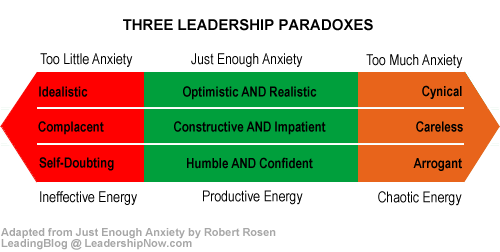  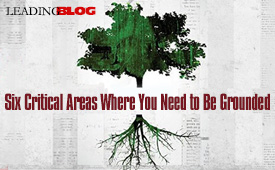 
Posted by Michael McKinney at 10:30 AM
04.21.08

Maxwell’s Gold: Lessons Learned From a Lifetime of Leading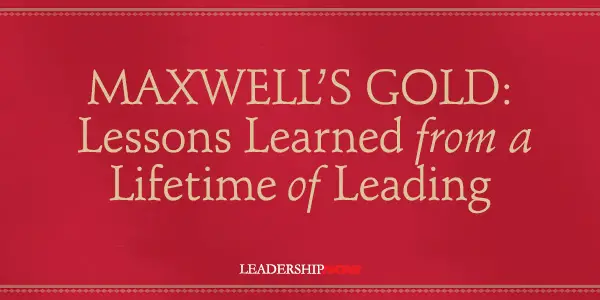
IN Leadership Gold, John Maxwell looks back on 60 years and distills what he has learned about leadership to date. And he stresses that he is still learning. It contains 26 important lessons about leadership and human relationships that are well worth reviewing. It’s a mentoring-style book. He says that leadership can be learned by anyone, but it’s not easy. Leadership is demanding and complex. He writes:

Posted by Michael McKinney at 10:35 AM
04.14.08

Getting the Information You NeedIn the Spring issue of the Leader to Leader Journal, authors Mark Ronald and Robert Shaw tackle the issue of getting the good information needed to make informed decisions in Developing Peripheral Vision. The problem we are often faced with is that people are reluctant to talk about their concerns. They write, “For a variety of reasons, individuals often communicate in subtle or even misleading ways in regard to how they feel about a key decision.” There is a lot that we as leaders, can do contribute to the problem of open and clear communication.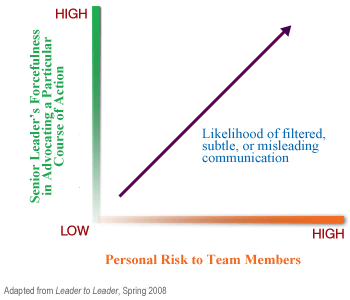 They list six behavioral flags or signals that might mean that the leader needs to take more direct action to get the information they need. In brief: Silence: In leadership teams, members who don’t support the trend of a decision often simply disengage from the dialogue and remain silent rather than pose a contrary point of view—particularly if the leader appears to support the decision or the group is moving quickly to closure. Who has checked out? Non-answers: People can opt out by appearing to agree with the leader when, in fact, they do not. “If you think it’s the right decision, that’s good enough for me.” Omissions: It is often what is not said that is most critical—particularly on issues that the leader believes will be problematic. Specific language: People surface their true feelings in hundreds of subtle ways. Leaders need to pay attention to the specific use of words that are flags suggesting that more discussion or follow-up is needed. Offline input: Often, the insights people bring to a leader (or each other) during the breaks of meetings or in informal hallway conversations are more important than what is said in formal discussions. E-mail traffic: In many firms, e-mail offers insight into potential issues that may require a leader’s attention. For example, an overly formal e-mail message with multiple people copied (or blind copied) is often a protective action taken by a team member with concerns. It is up to the leader to determine what is important and what is simply noise.
Posted by Michael McKinney at 01:26 AM
04.09.08

The Lack of Substance in Public Speeches
PUBLIC speaking expert Michael Osborn recently delivered a speech to the Georgia Communication Association, where he stated that he has watched a problem become a crisis. The crisis is the lack of substance in the speeches we hear. He states: It is the declining quality of reasoning, the neglect of evidence both by speakers and listeners. It is the erosion of standards that lets so much slide by unquestioned—and that results sometimes in tragically flawed policies and practices. It is our impatience with debate and our unwillingness to play active roles as citizens in deciding public policy. As leaders, are we leading or pandering? It’s time to build up our thinking, reasoning and reasearching skills to counter “an increasingly mass-mediated and cynical culture.”
Posted by Michael McKinney at 09:21 AM
04.07.08

Why Should the Boss Listen to You?
• “Had they asked me, we could have avoided that dumb series of mistakes.”
The mindset these comments reveal is quite common, says Jim Lukaszewski in his book, Why Should the Boss Listen to You?, but this sort of approach will always get in the way of your becoming a trusted advisor. Who doesn’t want to be noticed? Get ahead? Who doesn’t want to be asked in on decisions before they are made? Lukaszewski says that it is largely a matter of perspective. According to Lukaszewski, it is imperative that you “set aside all your staff-based assumptions and orient your life, your thinking, and your recommendations to the perspectives, viewpoints, and issues of those you advise.” You need to learn to work from a much broader perspective. Lukaszewski describes how leaders think and operate and why this is important to the trusted advisor. At the core of this book, he presents a seven-discipline approach to becoming a strategic trusted advisor.
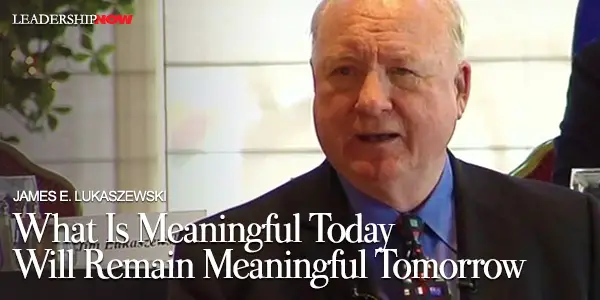
His advice is clearly written and right on. He writes, “The counselor’s prime directive is always to look at the questions, issues, opportunities, and vulnerabilities from the boss’s perspective first, and to test all advice against the leader’s perspective. This approach leads to better, more useable advice, more quickly.” 
Posted by Michael McKinney at 12:05 AM
04.04.08

Knowledge-Age Organizations Need a Leadership System In this time of historical change, even the most effective network leaders are not the only kind we need. They won’t stretch us out of our comfort zones, they won’t inspire us to tackle the big problems facing our country, they won’t transform bureaucratic organizations for the knowledge age, and they won’t make the tough decisions that have to be made when there’s no consensus. For that, we need different types of leaders who collaborate. Knowledge-age organizations need a leadership system rather than a set of individual leaders.
In this time of historical change, even the most effective network leaders are not the only kind we need. They won’t stretch us out of our comfort zones, they won’t inspire us to tackle the big problems facing our country, they won’t transform bureaucratic organizations for the knowledge age, and they won’t make the tough decisions that have to be made when there’s no consensus. For that, we need different types of leaders who collaborate. Knowledge-age organizations need a leadership system rather than a set of individual leaders.
In the age of knowledge work, leadership has become more essential as well as more complex than in earlier times. Adapted from The Leaders We Need by Michael Maccoby.
Posted by Michael McKinney at 11:27 AM
04.03.08

What Makes Us Human Conference If you’re going to be in the Los Angeles area at the end of this month, you might want to check out the What Makes Us Human Conference. Asking what makes human beings unique brings to mind a seemingly endless list of attributes and activities, both positive and negative. Self-awareness and free moral agency, speech and symbolic cognition, our nimble thumbs, conscience, and the capacity to imagine: these are just a few of the traits that distinguish us from other species. Join some of today's leading thinkers from a broad spectrum of backgrounds, including religion, psychology, biochemistry, social philosophy, humor, art, and music, as they present their views on the many faces of humanness at the What Makes Us Human Conference, April 28 - 29, 2008 (Monday/Tuesday). Two days of panel discussions and question-and-answer opportunities will explore topics ranging from the age-old question of what sets us apart to what the future may hold for humanity. A collection of essays edited by Charles Pasternak, What Makes Us Human? is also available. 
Posted by Michael McKinney at 08:52 AM
04.02.08

Out of Context: Work-Family Conflict"There is no such thing as a firewall between personal issues and work productivity. That’s because we can't have two brains we can interchange depending on whether we are in our office or in our bedroom. Stress in the workplace affects family life, causing more stress in the family. More stress in the family causes more stress at work, which in turn gets brought home again. It’s a deadly, self-feeding spiral, and researchers call it “work-family conflict.” So you may have the most wonderful feelings about autonomy at work, and you may have tremendous problem-solving opportunities with your colleagues. But if your home life is a wreck, you can still suffer the negative effects of stress, and so can your employer."
Posted by Michael McKinney at 09:32 AM
04.01.08

Leadership Books: April 2008




Posted by Michael McKinney at 12:04 AM
|
BUILD YOUR KNOWLEDGE


How to Do Your Start-Up Right STRAIGHT TALK FOR START-UPS 
Grow Your Leadership Skills NEW AND UPCOMING LEADERSHIP BOOKS 
Leadership Minute BITE-SIZE CONCEPTS YOU CAN CHEW ON 
Classic Leadership Books BOOKS TO READ BEFORE YOU LEAD |
|